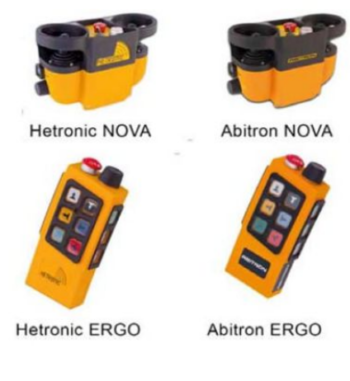by Dennis Crouch
The Supreme Court held oral arguments on March 21, 2023 in the international trademark case of Abitron Austria GmbH v. Hetronic International, Inc. and will be holding arguments on March 22, 2023 in the whisky dog toy trademark case of Jack Daniel’s Property v. VIP Products.
Abitron was formerly the international distributor for Hetronic radio-remote-control products used largely for heavy machinery. Hetronic products have a distinctive yellow-black coloring pattern. At some point, Abitron began selling a competing product using the same pattern and same product names. (Image above). Hetronic sued and won a $90 million judgment based upon willful trademark infringement and goodwill injury. Hetronic also won on a contract claim, but contract law would not support this disgorgement remedy.
The $90 million award reflected the entire gross revenue of Abitron’s knockoff sales, 97% of those sales were outside of the USA. As Abitron wrote in it its brief: these “were sales in foreign countries, by foreign sellers, to foreign customers, for use in foreign countries, that never reached the United States or confused U.S. consumers.” Of course, this foreign anaphora omits a key domestic conclusion: the harm was directed to the USA and felt in the USA by the TM owner. Of course, the leading justifications for TM law are tied to customer harm, and we only assign rights to the business unit because it quickly solves a collective action problem. In that framework, any harm caused by Abitron is also felt abroad — with confusion of its non-us customers.
On appeal, the 10th Circuit sided with Hetronic and confirmed the award. The U.S. Supreme Court then granted certiorari on the following question:
Whether the court of appeals erred in applying the Lanham Act extraterritorially to petitioners’ foreign sales, including purely foreign sales that never reached the United States or confused U.S. consumers.
Petition. At oral arguments, Lucas Walker (MoloLamken and former Gorsuch clerk) argued on behalf of the adjudged infringer; Matthew Hellman (Jenner & Block and former Souter clerk) argued on the other side; and Masha Hansford (SG’s office) largely sided with petitioner.
Although U.S. law is generally thought to not apply extraterritorially, trademark law has had a somewhat different path triggered by the Court’s decision in Steele v. Bulova Watch Co., 344 U.S. 280 (1952), which allowed for collection of damages for foreign infringement. Petitioners here both distinguish Steele and suggest that it could be overruled.
In my view, this level of extraterritorial application creates a sovereignty conflict, with the USA extending its reach unduly into the realm covered by trademark and competition laws of other nations. Sovereignty principles recognize the independence of each nation and are built upon principles of non-interference — that nations should not interfere with the internal affairs of other nations. This is a situation that calls for the court to exercise comity and abstain from extending its reach absent a clear statement and authorization from Congress. Rather, if a trademark holder wants to sue for confusing sales made in Europe, Europe is the location where the parties should deal with the issue.

[Of course, the leading justifications for TM law are tied to customer harm, and we only assign rights to the business unit because it quickly solves a collective action problem.]
Of course, this ignores the justifications for protecting proprietors from unfair competition though others taking advantage of their goodwill.
Meh – it is notable that the ’rights’ of a holder of the IP has those ‘rights’ generated under a different Constitutional Clause.
That protection of proprietors was never meant to be separated or more powerful than the protection of consumers.
Your argument is just not as strong of a point as you appear to think it to be.
“ Your argument is just not as strong of a point as you appear to think it to be.”
Translation: I can think of anything sensible to say so I will project my weird personal thoughts onto your comment and then attack those thoughts with an unsupported conclusion.
“can” should be “can’t”
FEEL THE POWER OF AI!!!
Let’s be clear here Malcolm.
ALL that your post reveals are YOUR feelings – as completely disconnected to the point at hand as they are.
Your “translation” shows that you have zero understanding of the first two sentences of my post with YOU just not understanding trademark law in comparison to patent law.
Thus it just is not a surprise how wrong you are on each of:
“anything sensible” (my post is purely sensible)
“Project… weird personal feelings” (it is ONLY YOU doing the projecting, and yes, of your own weird personal feelings, as my post is not at all about “feelings,” and quite tied to law), and
“Attack.. with unsupported… ” clearly, you exhibit your lack of knowledge with your feelings that my post is unsupported — it is supported by basic understanding of the different Constitutional moorings between trademarks (Commerce Clause) and patents (Patent Clause) — and it is clear that YOU feel by using the word ‘attack’ somehow my post must be off-point). My post may well be “an attack,” but it is eminently On Point and in accord with the law.
Hetronic products have a distinctive yellow-black coloring pattern.
It’s a good thing that this is a big fat red herring, because otherwise, Fluke has entered the chat.
Well, Klaus Schwab would have a different thing to say vis a vis Sovereignty issues.
I think you mean the Supreme Court held oral arguments…
“Europe is the location where the parties should deal with the issue.”
This is correct; even though the blatant, brazen copying is hard to stomach.
Comments are closed.